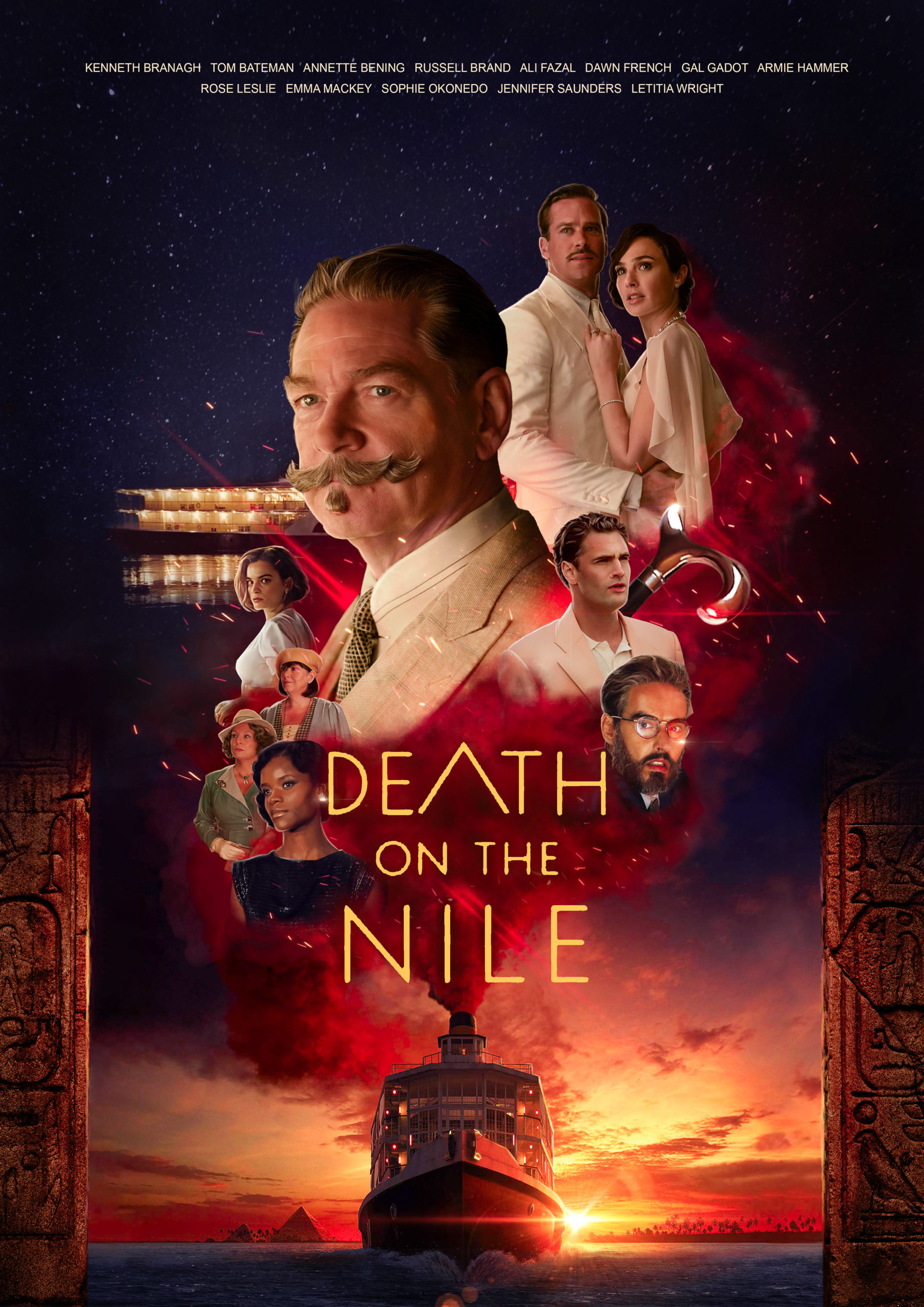
07 Feb Death on the Nile Review
DEATH ON THE NILE
dir. Kenneth Branagh, starring Kenneth Branah, Tom Bateman, Armie Hammer, Gal Gadot, et. al
Death on the Nile, the followup to 2017’s Murder on the Orient Express, reunites audiences with famous detective Hercule Poirot while introducing a new mystery and a new star-studded cast of suspicious characters. Beginning with a flashback to the days of a younger Poirot, the movie sets up one of the major themes of the film, a bitter and cynical look at love. Emma Mackey’s Jacqueline de Bellefort introduces her new fiancée Simon Doyle to her old friend Linnet Ridgeway, with the relationship souring and Ridgeway running off with Doyle. From there, as Ridgeway, Doyle, and a host of assorted friends and frenemies celebrate their new nuptials while floating down the Nile River, the bodies begin to pile up.
If there’s a message to be had about the dangers of greed or the selfishness of the rich, all attempts were lost due to an overly convoluted plot, weak script, and poor performances. The novelty of the jam packed ensemble murder mystery, one that seems to be slowly creeping back into the public’s consciousness thanks to the delightful surprise of Knives Out, lacks the same punch and flavor of Orient Express. A celebration of excess and decadence, a movie that was presented with the opportunity to decry these things chooses instead to give in to style over substance. With at least four different plot points being juggled to varying degrees of success, the film is overstuffed with underdeveloped characters, unnecessary exposition and a needless flashback to begin the story. Death on the Nile is a far cry from its predecessor, lacking in the fun cheekiness of the whodunit thriller.
Starring Branagh, Gadot, and Hammer, Death on the Nile’s acting is a major player in the disappointment of the film. As the central three, only Branagh appears to be enjoying himself, reprising his role as famed detective Hercule Poirot. Branagh’s delight and love for the character is apparent in the film, and his performance is one of the few good ones. Gadot’s Linnet Ridgeway-Doyle proves to be one of her weakest performances yet, almost sleepwalking through her lines and scenes to a less than subpar conclusion. Armie Hammer isn’t much better; coming off the disastrous remake of Rebecca, Hammer, whose shown moments of brilliance in his acting career, seems the right fit to portray the role of newly endowed dashing husband, but also falls flat.
Featuring another gimmicky laden cast of actors and actresses spanning multiple generations, Death on Nile’s main problem is lack of development. Outside of the main three, and Tom Bateman as Poirot’s trusty right hand man Bouc, a majority of the people aboard the S.S. Karnak seem to exist merely to be murdered or increase the number of possible suspects. Academy nominated actresses Annette Bening and Sophie Okonedo have scant little to work with while the likes of Russel Brand, mostly relegated to voice work these days, puts in a solid performance of what could’ve been an interesting character, but is ultimately undercut by his lack of screen time. Dawn French and Jennifer Saunders, creators of the eponymous sketch comedy duo French and Saunders, are little more than set dressing whose involvement ultimately influences little of the overall story. It’s unclear if these shoddy performances are due to weak scripts, weak acting, or both, but what is clearly evident is the fact that with the exception of Branagh and Tom Bateman as Bouc, none of the actors and actresses were on their game in this movie.
Kenneth Branagh, who also directed Murder on the Orient Express, returns to the chair yet again to direct Death on the Nile. Technically, Branagh is still in fine form, crafting an early 1900s look that still manages to feel decidedly modern. Fresh off his hit film Belfast, the director continues to prove his eye for shot composition and camera movement is still as keen and sharp as ever. While the foundation of Death on the Nile may be incredibly weak, no fault can be placed on Branagh the director. The film is littered with gorgeous shots, making use of the Moroccan background to deliver a lush, visually vibrant film that leaps off the screen. The production design and costuming make liberal use of the themes of the inconsiderate rich; well-tailored suits and dresses combine with the ritzy set interiors prove that the crew of the movie came prepared. Patrick Doyle also returns to deliver a somewhat mediocre score; a serviceable affair that will fade from the viewer’s memory before they reach their car.
Overall, Death on the Nile fails as both a sequel to Murder on the Orient Express and as a movie that stands on its own legs. A film that’s basically all style with very little substance, it attempts to subvert the expectations levied on it from the first film in ways that ultimately come across as trite or downright lazy. Chock full of cheesy deliveries and hammy acting, it seems more an excuse for the actors to spend time lounging in Morocco than anything else. While technically interesting at times, there’s far too little to keep the story engaging and entertaining. Death on the Nile hits theaters February 11th.
Review by Darryl Mansel


No Comments